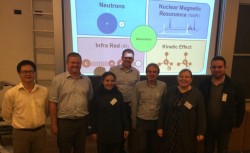The SINE2020 Chemical Deuteration WP: an interview with the coordinator
Hanna Wacklin from the European Spallation Source in Sweden is the coordinator of the EU-funded SINE2020 collaboration activity on Chemical Deuteration. She tells us the story of the activity, aims and how the group is planning to accomplish results. *What is deuteration?* Neutrons have a special property as they can see hydrogen and the heavy isotope deuterium completely differently. Hydrogen atoms can thus be replaced with deuterium which will be more visible. In principle all neutron scattering methods can employ this to highlight a structure or components in a structure, and only see certain parts at a time, and therefore solve very complex structures. A large part of materials analysed by neutron scattering are organic, and that is what we are aiming at, i.e. organic molecules that you can use e.g. in liquid crystals or other everyday-materials. By replacing the hydrogen in them with deuterium we can either obtain a better signal when analysing them with neutrons, or better contrast, or highlight specific parts of a structure to understand the relation between components. A lot of the things that we use in our everyday life, such as personal-care products like cosmetics, cleaning products, as well as a number of advanced materials as e.g. solar cells have these types of components, so this technique can be widely applied. *How did the idea for the SINE2020 collaboration activity on Chemical Deuteration come up?* We have been talking with the Institut Laue-Langevin (ILL) on how we could collaborate more and we had been working together on a PhD project in deuteration of lipids in cell cultures. But when we saw the SINE2020 consortium forming, we thought that it would be nice to involve other facilities, and other types of deuteration expertise. We’ve contacted the facilities and got ISIS and FZ Jülich involved, as well as ANSTO in Australia as an observer. *What are the aims of the activity and how will you achieve them?* Our goal is to develop both methods and a platform for users. The idea is that by forming a network of deuteration labs which have different kinds of expertise, and can deuterate and synthesise different kinds of molecules, we can more likely produce different types of compounds for the user community, and broaden the types of synthesis that we can make. Our goal is thus to set-up a new platform that, after SINE2020 is concluded, can offer access to the facilities to the European user community. We will also prepare a survey for the users so that we can learn what the needs are, how the user community would like such a platform to function (how it is managed, how people get access to it, who funds it). These are very important questions as we have never tried to do this together. Currently one applies for beamtime at one specific facility. But what if the molecule you need has to be deuterated at some other facility? Or maybe even at two different facilities. How will it work if we have a joint access system? *What are the benefits of taking part in a project supported by SINE2020?* For us the biggest advantage is to have this network. We will collaborate on joint projects where part of a material is made in a lab, the rest is made in another lab, and the third lab makes the final purification and characterisation, so we can combine our expertise. This will allow us to produce new materials e.g. bio-plastics. Furthermore we will benefit from the SINE2020 outreach activities. Industry is often not familiar with the benefits of using neutron scattering or deuteration. Together with the Industry activity we will not only advertise the techniques themselves but provide consultation on how one can select the materials to be analysed. SINE2020 (Science and Innovation with Neutrons in Europe in 2020) is a consortium of 18 partner institutions from 12 countries, funded by the EU through H2020. Further info: http://sine2020.eu/news-and-media/chemical-deuteration-wp-interview-with-the-coordinator.html(opens in new window)
Countries
Australia, Germany, France, Sweden, United Kingdom



